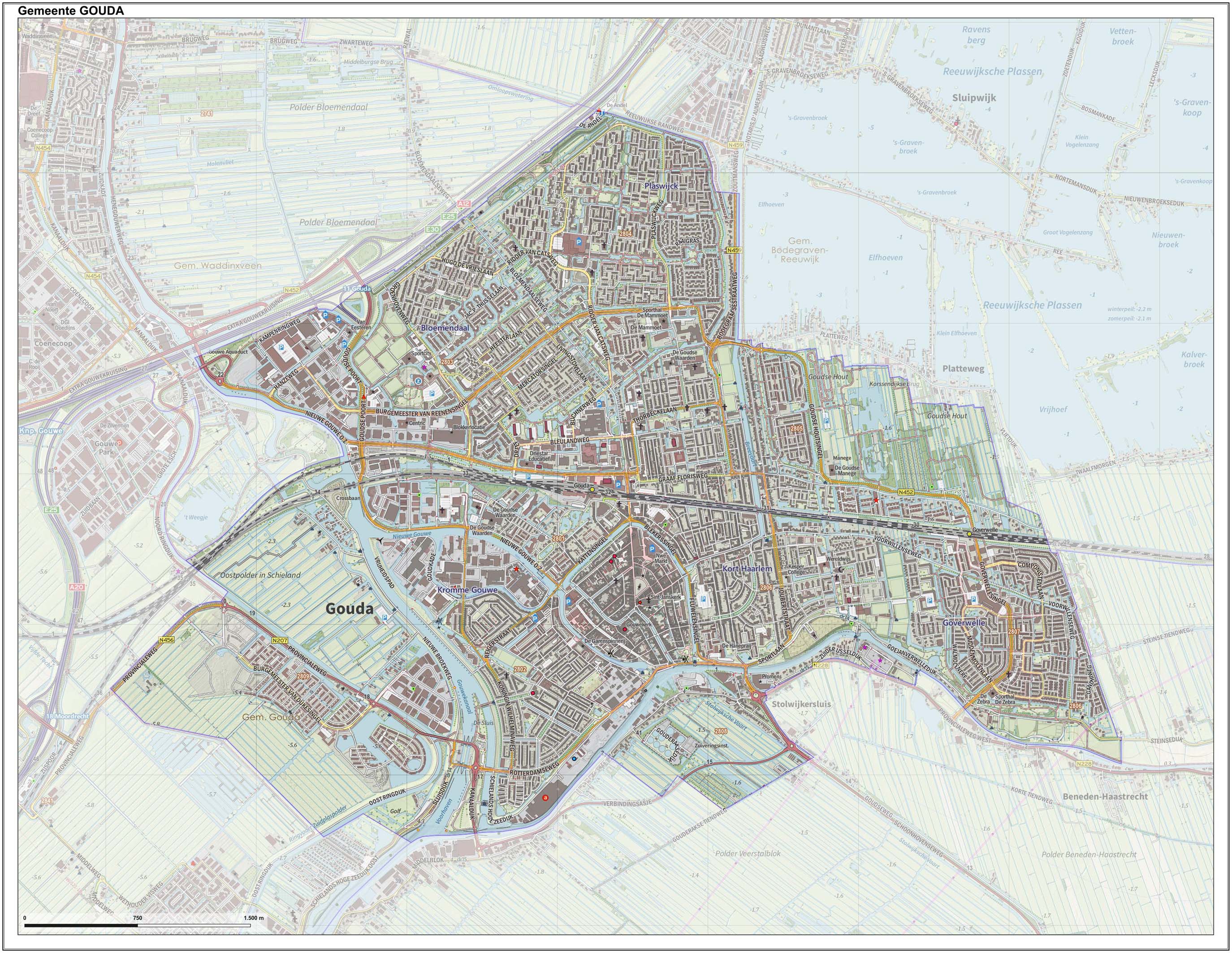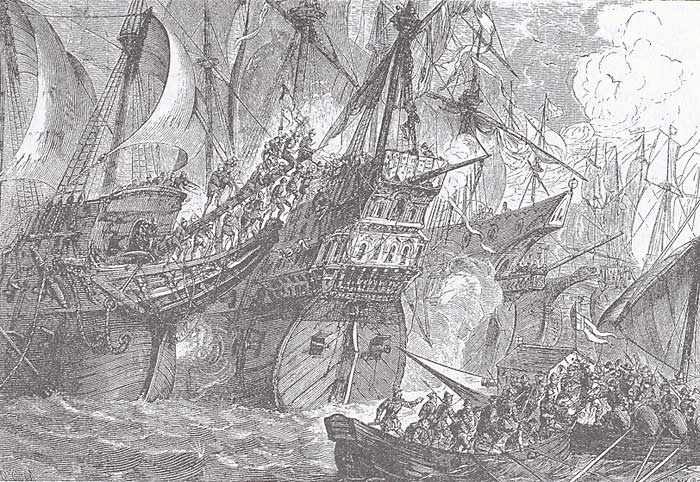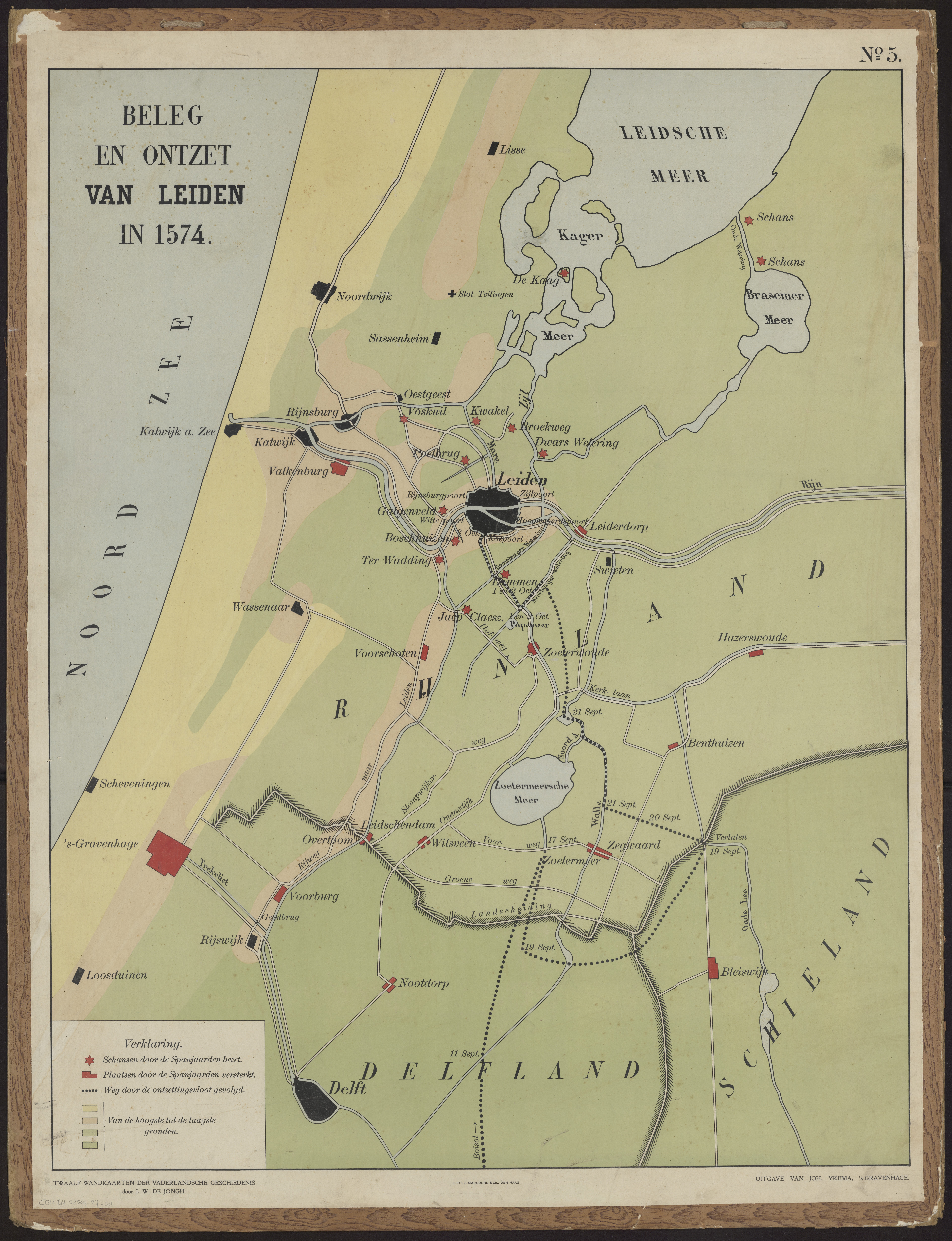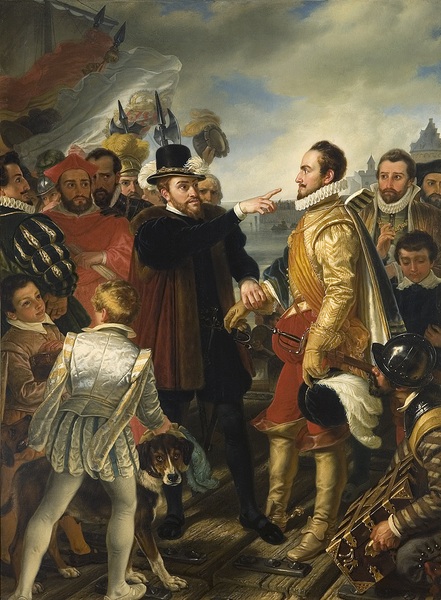|
Capture Of Valkenburg (1574)
The Capture of Valkenburg of 1574, took place in early February 1574, at Valkenburg, South Holland (present-day the Netherlands), during the Eighty Years' War and the Anglo-Spanish War (1585–1604), in the context of the siege of Leiden.Fissel p.141 The fortress of Valkenburg (northwest of Leiden), garrisoned by five English companies commanded by Colonel Edward Chester, was of strategic importance to facilitate (or complicate) the Spanish efforts at Leiden.Oscar Gelderblom p.47 In early February, when the Spanish troops (sent by ''Maestre de Campo'' Don Francisco de Valdés) advanced over Valkenburg Castle, the English troops surrendered the fortress to the Spaniards and fled towards Leiden. Then, the Spanish forces entered and took possession of the fortress (Spanish: ''tomando la fortaleza a placer''). For the cowardice demonstrated at Valkenburg, the English troops were rejected by the Dutch rebel army at Leiden, and finally Chester's troops surrendered to the Spanish a ... [...More Info...] [...Related Items...] OR: [Wikipedia] [Google] [Baidu] |
Eighty Years' War
The Eighty Years' War or Dutch Revolt (; 1566/1568–1648) was an armed conflict in the Habsburg Netherlands between disparate groups of rebels and the Spanish Empire, Spanish government. The Origins of the Eighty Years' War, causes of the war included the Reformation, Centralised state, centralisation, excessive taxation, and the rights and privileges of the Dutch nobility and cities. After Eighty Years' War, 1566–1572, the initial stages, Philip II of Spain, the sovereign of the Netherlands, deployed Army of Flanders, his armies and Eighty Years' War, 1572–1576, regained control over most of the rebel-held territories. However, Spanish Fury, widespread mutinies in the Spanish army caused a general uprising. Under the leadership of the exiled William the Silent, the Catholic and Protestant-dominated provinces sought to establish religious peace while jointly opposing the king's regime with the Pacification of Ghent, but the Eighty Years' War, 1576–1579, general rebelli ... [...More Info...] [...Related Items...] OR: [Wikipedia] [Google] [Baidu] |
Gouda, South Holland
Gouda () is a List of cities in the Netherlands by province , city and List of municipalities of the Netherlands , municipality in the west of the Netherlands, between Rotterdam and Utrecht (city), Utrecht, in the Provinces of the Netherlands , province of South Holland. Gouda has a population of 75,000 and is famous for its Gouda cheese, stroopwafels, many , smoking pipe (tobacco) , smoking pipes, and its 15th-century city hall. Its array of historic churches and other buildings makes it a very popular Tourism in the Netherlands , day-trip destination. In the Middle Ages the family founded a settlement at the location of the current city and built a fortified castle alongside the banks of the Gouwe (river) , Gouwe River, from which the family and the city took their names. Locals long called the settlement , or or ' for short. The area, originally marshland, developed over the course of two centuries. By 1225, a canal was linked to the Gouwe and its estuary became a harbou ... [...More Info...] [...Related Items...] OR: [Wikipedia] [Google] [Baidu] |
Sieges Involving Spain
A siege () . is a military blockade of a city, or fortress, with the intent of conquering by attrition, or by well-prepared assault. Siege warfare (also called siegecrafts or poliorcetics) is a form of constant, low-intensity conflict characterized by one party holding a strong, static, defensive position. Consequently, an opportunity for negotiation between combatants is common, as proximity and fluctuating advantage can encourage diplomacy. A siege occurs when an attacker encounters a city or fortress that cannot be easily taken by a quick assault, and which refuses to surrender. Sieges involve surrounding the target to block provision of supplies and reinforcement or escape of troops (a tactic known as "investment"). This is typically coupled with attempts to reduce the fortifications by means of siege engines, artillery bombardment, mining (also known as sapping), or the use of deception or treachery to bypass defenses. Failing a military outcome, sieges can often be deci ... [...More Info...] [...Related Items...] OR: [Wikipedia] [Google] [Baidu] |
John Lothrop Motley
John Lothrop Motley (April 15, 1814 – May 29, 1877) was an American author and diplomat. As a popular historian, he is best known for his works on the Netherlands, the three volume work ''The Rise of the Dutch Republic'' and four volume ''History of the United Netherlands''. As United States Minister to Austria in the service of the Abraham Lincoln administration, Motley helped to prevent European intervention on the side of the Confederates in the American Civil War. He later served as Minister to the United Kingdom (Court of St. James) during the Ulysses S. Grant administration. Biography John Lothrop Motley was born on April 15, 1814, in Dorchester, Massachusetts. His grandfather, Thomas Motley, a jail-keeper (a public position) and innkeeper in Portland, Maine, had been a Freemason and radical sympathizer with the French Revolution. His father Thomas and uncle Edward served mercantile apprenticeships in Portland."Motley, John Lothrop". ''Encyclopædia Britannica''. (1 ... [...More Info...] [...Related Items...] OR: [Wikipedia] [Google] [Baidu] |
List Of Governors Of The Habsburg Netherlands
The governor () or governor-general () of the Habsburg Netherlands was a representative appointed by the Holy Roman emperor (1504-1556), the king of Spain (1556-1598, 1621-1706), and the archduke of Austria (1716-1794), to administer the Burgundian Netherlands, Burgundian inheritance of the House of Habsburg in the Low Countries when the monarch was absent from the territory. The role of the governors-general significantly changed over time: initially tutors and advisors of Emperor Charles V, who lived at the Palace of Coudenberg, they served as generals during the Eighty Years' War between the Kingdom of Spain and the Dutch Republic. Frequently, the governor-general was a close relative of the Austrian or Spanish monarchs, though at other times Spanish or German noblemen filled the role. The governor-general was usually based in Brussels. List of governors {, class="wikitable" style="width:80%;text-align:center" !Picture !Name !Took office !Left office !Relationship to monarch ... [...More Info...] [...Related Items...] OR: [Wikipedia] [Google] [Baidu] |
Battle Of Reimerswaal
The Battle of the Scheldt also known as the Battle of Walcheren (known in Dutch as Slag bij Reimerswaal) was a naval battle that took place on 29 January 1574 during the Eighty Years' War and the Anglo–Spanish War.Bruce & Cogar pp.47-48Rodger p.145Jaques p.1091 The battle was fought between a Dutch rebel '' Sea Beggar'' fleet (which included English and Scottish troops) under and a Spanish fleet under Julián Romero.Knight, Charles Raleigh: ''Historical records of The Buffs, East Kent Regiment (3rd Foot) formerly designated the Holland Regiment and Prince George of Denmark's Regiment''. Vol I. London, Gale & Polden, 1905p. 11-12/ref> The Spanish fleet was attempting to relieve the Spanish held town of Middelburg which was under siege but the fleet under Boisot intercepted them and were victorious with the destruction or capture of nearly fifteen ships.Nolan p.245Fissel p 152 Middelburg as a result then surrendered only nine days later along with Arnemuiden. Background In ... [...More Info...] [...Related Items...] OR: [Wikipedia] [Google] [Baidu] |
Siege Of Leiden
The siege of Leiden occurred during the Eighty Years' War in 1573 and 1574, when the Spanish under Francisco de Valdez attempted to capture the rebellious city of Leiden, South Holland, the Netherlands. The siege failed when the city was successfully relieved in October 1574. Background In the war that had broken out (eventually called the Eighty Years' War), Dutch rebels took up arms against the Habsburg king of Spain, whose family had inherited the Seventeen Provinces of the Netherlands. Most of the counties of Holland and Zeeland were occupied by rebels in 1572, who sought to end the harsh rule of the Spanish Duke of Alba, governor-general of the Netherlands. The territory had a high density of cities, which were protected by defense works and by the low-lying boglands, which could easily be flooded by opening the dykes and letting in the sea. The Duke of Alba tried to break resistance using brute force. He used Amsterdam as a base, as this was the only city in the county of ... [...More Info...] [...Related Items...] OR: [Wikipedia] [Google] [Baidu] |
Emanuel Van Meteren Historie Ppn 051504510 MG 8715 Franciscus De Valdezio
{{disambiguation, geo, school ...
Emanuel may refer to: * Emanuel (name), a given name and surname (see there for a list of people with this name) * Emanuel School, Australia, Sydney, Australia * Emanuel School, Battersea, London, England * Emanuel (band), a five-piece rock band from Louisville, Kentucky, United States * Emanuel County, Georgia * ''Emanuel'' (film), a 2019 documentary film about the Charleston church shooting See also * Emmanuel (other) * Emanu-El (other) * Emmanuelle (other) * Immanuel (other) * Emmanouil (Εμμανουήλ), the modern Greek form of the name * Manuel (other) Manuel may refer to: People * Manuel (name), a given name and surname * Manuel (''Fawlty Towers''), a fictional character from the sitcom ''Fawlty Towers'' * Manuel I Komnenos, emperor of the Byzantine Empire * Manuel I of Portugal, king of Po ... [...More Info...] [...Related Items...] OR: [Wikipedia] [Google] [Baidu] |
Battle Of Mookerheyde
A battle is an occurrence of combat in warfare between opposing military units of any number or size. A war usually consists of multiple battles. In general, a battle is a military engagement that is well defined in duration, area, and force commitment. An engagement with only limited commitment between the forces and without decisive results is sometimes called a skirmish. The word "battle" can also be used infrequently to refer to an entire operational campaign, although this usage greatly diverges from its conventional or customary meaning. Generally, the word "battle" is used for such campaigns if referring to a protracted combat encounter in which either one or both of the combatants had the same methods, resources, and strategic objectives throughout the encounter. Some prominent examples of this would be the Battle of the Atlantic, Battle of Britain, and the Battle of France, all in World War II. Wars and military campaigns are guided by military strategy, wher ... [...More Info...] [...Related Items...] OR: [Wikipedia] [Google] [Baidu] |
Sancho D'Avila
Don Sancho Dávila y Daza (21 September 1523 – 1583) was a Spanish general. Born at Ávila, he first served as the commander of the Duke of Alba's bodyguard. It was in this function that Dávila arrested the Count of Egmont. When the Eighty Years' War started, Dávila suffered a defeat in the Battle of Le Quesnoy. He was also involved in the 1572 Siege of Middelburg and the Battle of Flushing a year later. In 1574, Dávila defeated Louis and Henry, brothers of William the Silent, in the Battle of Mookerheyde. In 1576, as commander of the Spanish troops in the Citadel of Antwerp, he was the main instigator of the Sack of Antwerp in which between 7,000 and 18,000 lives and a great deal of property were lost. Four years later, he participated with the Duke of Alba at the Battle of Alcântara. In 1580, he captured the key Portuguese city of Porto which secured Spain's personal union with Portugal for more than 60 years and finished off António, Prior of Crato's army i ... [...More Info...] [...Related Items...] OR: [Wikipedia] [Google] [Baidu] |
William The Silent
William the Silent or William the Taciturn (; 24 April 153310 July 1584), more commonly known in the Netherlands as William of Orange (), was the leader of the Dutch revolt against the Spanish Habsburg Netherlands, Habsburgs that set off the Eighty Years' War (1568–1648) and resulted in the formal independence of the Dutch Republic, United Provinces in 1648. Born into the House of Nassau, he became Prince of Orange in 1544 and is thereby the founder of the House of Orange-Nassau, Orange-Nassau branch and the ancestor of the monarchy of the Netherlands. In the Netherlands, he is also known as Father of the Nation, Father of the Fatherland (; ). A wealthy nobleman, William originally served the Habsburgs as a member of the court of Margaret of Parma, governor of the Spanish Netherlands. Unhappy with the centralisation of political power away from the local estates and with the Spanish persecution of Dutch Protestants, William joined the Dutch uprising and turned against his fo ... [...More Info...] [...Related Items...] OR: [Wikipedia] [Google] [Baidu] |






